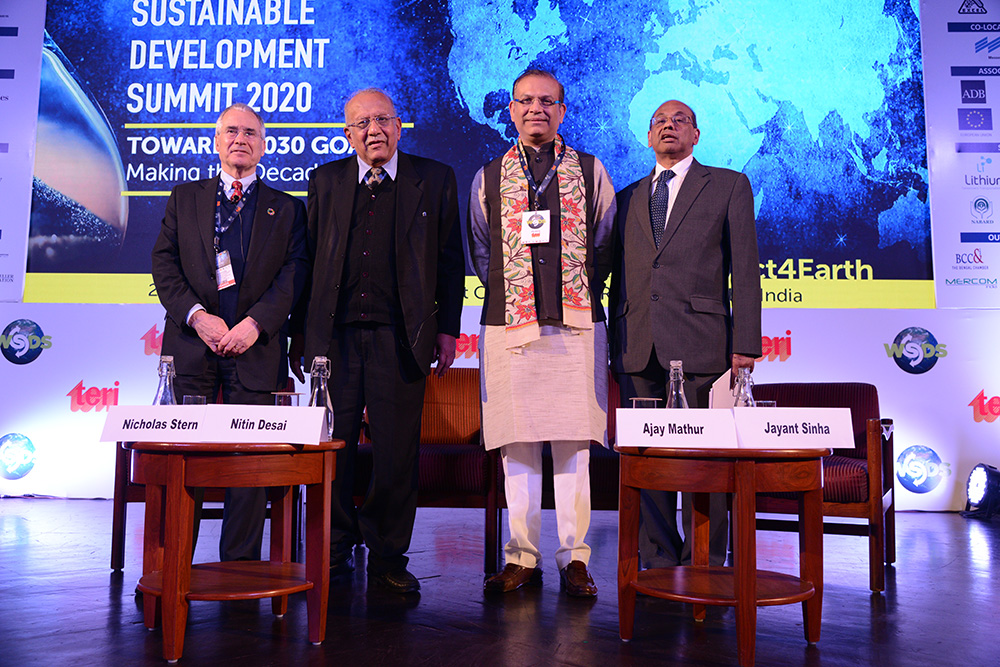Yes, we can

India’s overarching development goal is to deliver sustainable prosperity to its people; to help them lead peaceful, fulfilling lives in a clean and green environment. Achieving this goal requires that the Indian economy be simultaneously transformed along two different dimensions. First, India must strive to be globally competitive across a range of key sectors such as infrastructure, energy, financial services, aviation, telecom, and manufacturing. Second, India must also adopt a resource-efficient, low-carbon development pathway to utilize scarce natural resources effectively.
Speaking at the Valedictory session of TERI’s flagship event World Sustainable Development Summit (WSDS) 2020, Mr Jayant Sinha, Chairperson of the Parliamentary Standing Committee for Finance, said, “No nation has ever attempted these twin transformations simultaneously. The traditional development model has been a Farm-to-Factory development model with economies transitioning from traditional agriculture to resource-intensive, urban manufacturing. For India’s unique requirements, it has to forge a different development model – a model that will shift India’s workforce from agriculture to resource-efficient, globally leading businesses.” This model has to keep in mind the fact that India is expected to be a global leader in combating climate change to achieve the 2-degree Celsius global warming target.
Mr Sinha added that “these super competitive businesses will define the global technology/productivity frontier so that they can surpass the production processes of the best companies in the world. In addition, these companies will have to ensure that they use the most advanced green technologies and business models. India’s development model will, therefore, need to take the economy from Farm-to-Green Frontier”. Getting to the Green Frontier will fundamentally reconfigure the structure of the Indian economy and reshape investments, generation of jobs, and wealth creation. According to Mr Sinha, India’s green transformation must include:
- An appropriate institutional architecture to support the green transformation including legislation, independent monitoring organizations at the federal and provincial levels, dedicated funding agencies, major research programs at leading academic institutions, and expert bodies
- Unleashing market forces that drive green innovation and world-leading business models
- Sufficient financing capacity through public and private sources to ensure that necessary investments are made in low-carbon technologies and production processes
- Specific and stable policy goals laying out GHG emission targets, regular monitoring of green efforts, and willingness to take global leadership on climate change matters.
Professor Nicholas Stern from the London School of Economics supported Mr Sinha’s views by saying: “In defining climate actions, the conversation has moved from trade-offs to de-coupling to achieving zero-carbon growth. In fact, the drive to zero carbon economy is actually the growth story.”
According to Prof. Stern, the investments of the next two decades will be decisive for the planet and its future. “To have a reasonable chance of holding below 2°C, we have to cut emissions by around 40% absolutely in the next two decades. Much bigger cuts are necessary for 1.5°C. Since we live in a demand constrained world, the required change must be radical so that it can deliver over the next few decades, strong and inclusive growth and poverty reduction. It can boost output and sharpen supply in the short to medium term. It is already setting off a wave of Schumpeterian technical progress, which will be powerful over the coming decades.”
According to Professor Stern, “Action on climate change is one of the greatest challenges for public policy of our times. If we look back a decade, we will see that tremendous changes have occurred; be it in technology of telephones, engines, solar, or even LEDs. The question is how are we to make policies for changing technologies? We have to be ready with new regulations and standards. Therefore, public policies must be predictably flexible.”
Professor Stern summed up his address on a note of hope: “The opportunities are tremendous, but they are urgent. The pathways are clear for where we need to go. It will need radical changes and will not be easy. But yes, we can.”

